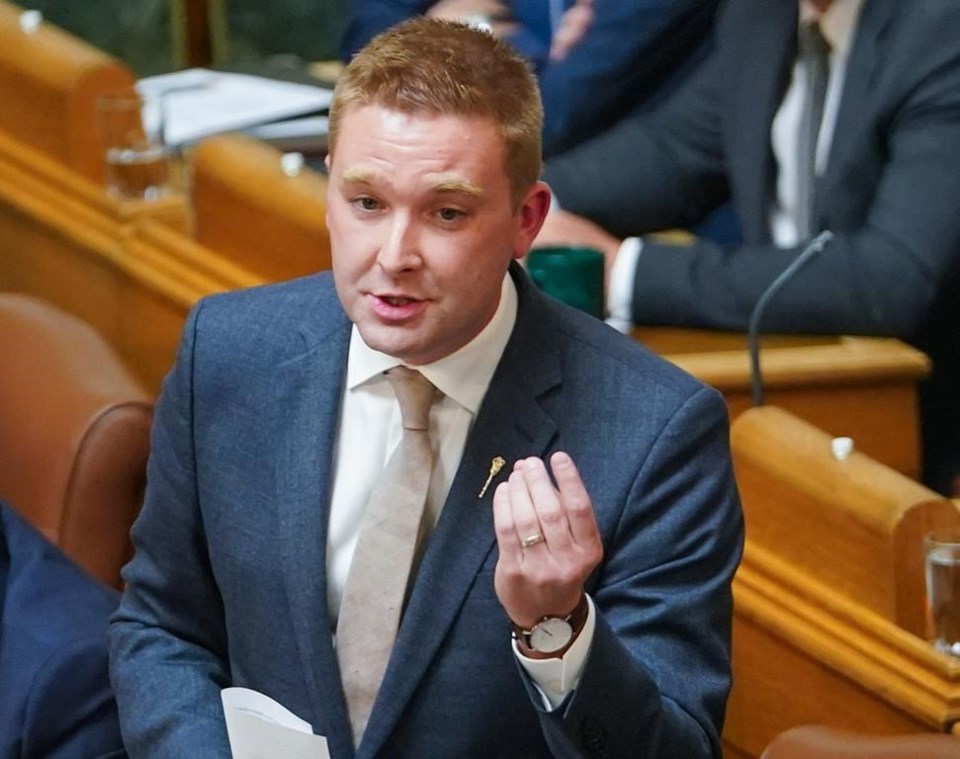REGINA — A Saskatchewan school division says the education minister never asked about a school guideline that he cited as the "impetus" for the province's proposed pronoun legislation.
Regina Public Schools said Tuesday that the administrative procedure, announced in June 2022, includes a section that says students have a right to be addressed by a name and pronoun that corresponds to their gender identity.
It says staff are not to disclose a student's sexual orientation, gender identity or gender expression unless the student gives permission or if there's an impending safety concern.
"We have never had an inquiry from the minister about (this) procedure," a school division spokesperson said in an email.
"We always have and always will work with parents, families and caregivers to keep them informed and ensure student well-being."
Education Minister Jeremy Cockrill told reporters this week that the school division's guideline was a main reason for tabling the legislation, which would require consent for pronoun and name changes in schools for students under 16.
"That really was the impetus," Cockrill said.
"We fundamentally believe that parents have an important role to play in those conversations (around pronouns). When they're excluded, explicitly or implicitly, then that's something that we need to correct."
When asked if he spoke with the school division about the guideline, Cockrill said he wasn't the minister at the time.
"This is before my time as minister, but an individual or multiple individuals – I'm not sure exactly which one it was, so you'll have to excuse me there – brought this policy forward," he said.
Premier Scott Moe later told reporters he doesn't know what conversations the school division had with the ministry.
"I can't answer that question because I haven't asked," he said.
A Regina Public Schools spokesperson said neither Cockrill nor former education minister Dustin Duncan inquired about the guideline.
The spokesperson said the guideline, which is meant to ensure gender diverse students have a safe and inclusive school environment, had in 2019 undergone significant consultations with employees, parents, students and experts.
The Saskatchewan Party government announced its pronoun policy in the summer.
Lawyers for UR Pride, a Regina LGBTQ organization, sought an injunction until a challenge could be heard in court later this year. It argued the policy violates Charter rights and could cause teachers to out or misgender children.
A judge granted the injunction at the end of September, prompting Moe to recall the legislature and table a bill containing the policy. It includes the notwithstanding clause, overriding sections of the Charter of Rights and Freedoms and Saskatchewan's Human Rights Code.
In her September report on the policy, Saskatchewan child advocate Lisa Broda said that to her knowledge children, school boards, teachers, experts on gender diversity and the Saskatchewan Human Rights Commission were not consulted.
Broda said the policy violates rights to gender identity and expression.
Heather Kuttai resigned this week from her position as Saskatchewan's human rights commissioner, calling the policy an attack on transgender and gender-diverse youth.
Cockrill said two school divisions, the North East School Division and the Saskatchewan Rivers Public School Division, had a policy that mirrored the government's.
He has said previously "tens of thousands" of people raised concerns over the issue, but later said "thousands."
The Opposition has said the government's answers keep changing.
"It's up to the premier, I guess, to keep his own speaking notes straight on this as to what the impetus is," NDP Leader Carla Beck said.
"They have not been able to provide any evidence that they've talked to any school board, let alone (Regina Public Schools)."
The government took nine days to draft its pronoun policy in August and released it to the public four days later.
It also received 18 letters, submitted from June to August, from people who said they support New Brunswick's pronoun policy, which is similar to Saskatchewan's. Seven of those who wrote the letters identified as parents of schoolchildren.
This report by The Canadian Press was first published Oct. 18, 2023.
Jeremy Simes, The Canadian Press



